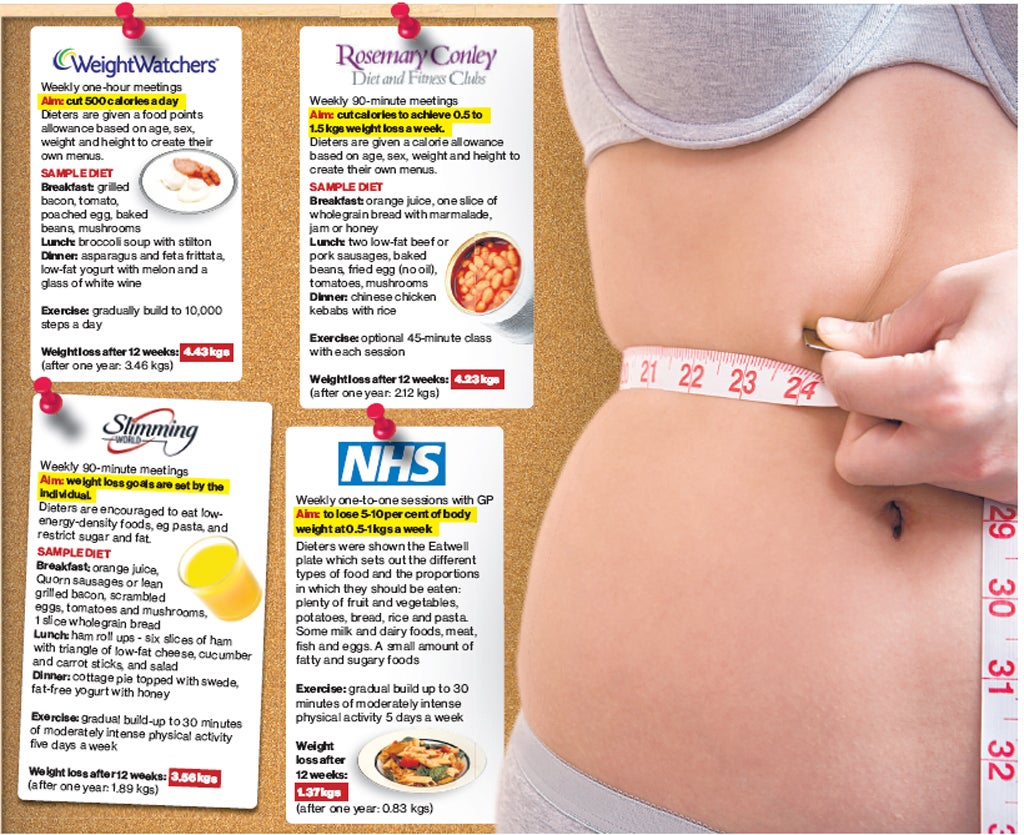Revealed: The diet that's worth its weight in gold
Study names Weight Watchers plan as best way to shed pounds

If you want to lose weight, a commercial company is more likely to help you shed the excess pounds than the NHS, researchers have found.
A comparison of three commercial weight loss clubs – Weight Watchers, Rosemary Conley and Slimming World – with programmes provided by GPs, pharmacists and dieticians, has shown the private sector comprehensively beats the NHS when it comes to helping people slim. The research was carried out in south Birmingham, where overweight patients selected by their GPs were offered the chance to be referred to a weight-loss programme paid for by the NHS. Half of the 740 patients were referred to the commercial slimming clubs and half to NHS programmes.
The greatest weight loss achieved was 4.4 kgs after 12 weeks, for the patients allocated to Weight Watchers while the smallest was 1.4kgs for those allocated to their GPs.
After one year the Weight Watchers group was the only one to achieve significantly greater weight loss – 3.46kgs – than the control group. Despite GPs' poorer results, their programme was the most expensive, at £112.73 per patient, compared with £76.87 for Weight Watchers (the price charged to the NHS). The Rosemary Conley programme also cost £76.87 and Slimming World £71.37. The study, by researchers from the University of Birmingham and published in the British Medical Journal (BMJ) is one of the first to compare NHS and private weight-loss programmes.
Two Australian nutrition experts say in an editorial in the BMJ that, on the basis of the results, the NHS should consider contracting out weight-loss programmes to the private sector, rather than training its NHS staff to provide them, to give patients more choice and bring better results. "It is not surprising that primary care is less able to deliver weight-loss programmes than commercial companies, given the lack of resources compared with an industry that has invested millions to refine its products."
A key reason why the commercial companies scored greater success was that the patients allocated to them kept coming back week after week. One in four adults in the UK is overweight or obese and 16 per cent are trying seriously to shed pounds at any one time. Rosemary Conley claims 80,000 members in the UK and Weight Watchers 1.5 million worldwide.
A spokesman for the Department of Health said: "The local NHS must think about which weight management service will work best, based on an individual patient's needs."
Earlier research has shown that most people on a diet achieve their maximum weight loss after six to eight months. It has been assumed this is a natural "plateauing" effect.
But evidence suggests that people find it hard to stick to a diet for longer than six months and that is why they stop losing weight.
Join our commenting forum
Join thought-provoking conversations, follow other Independent readers and see their replies
Comments
Bookmark popover
Removed from bookmarks